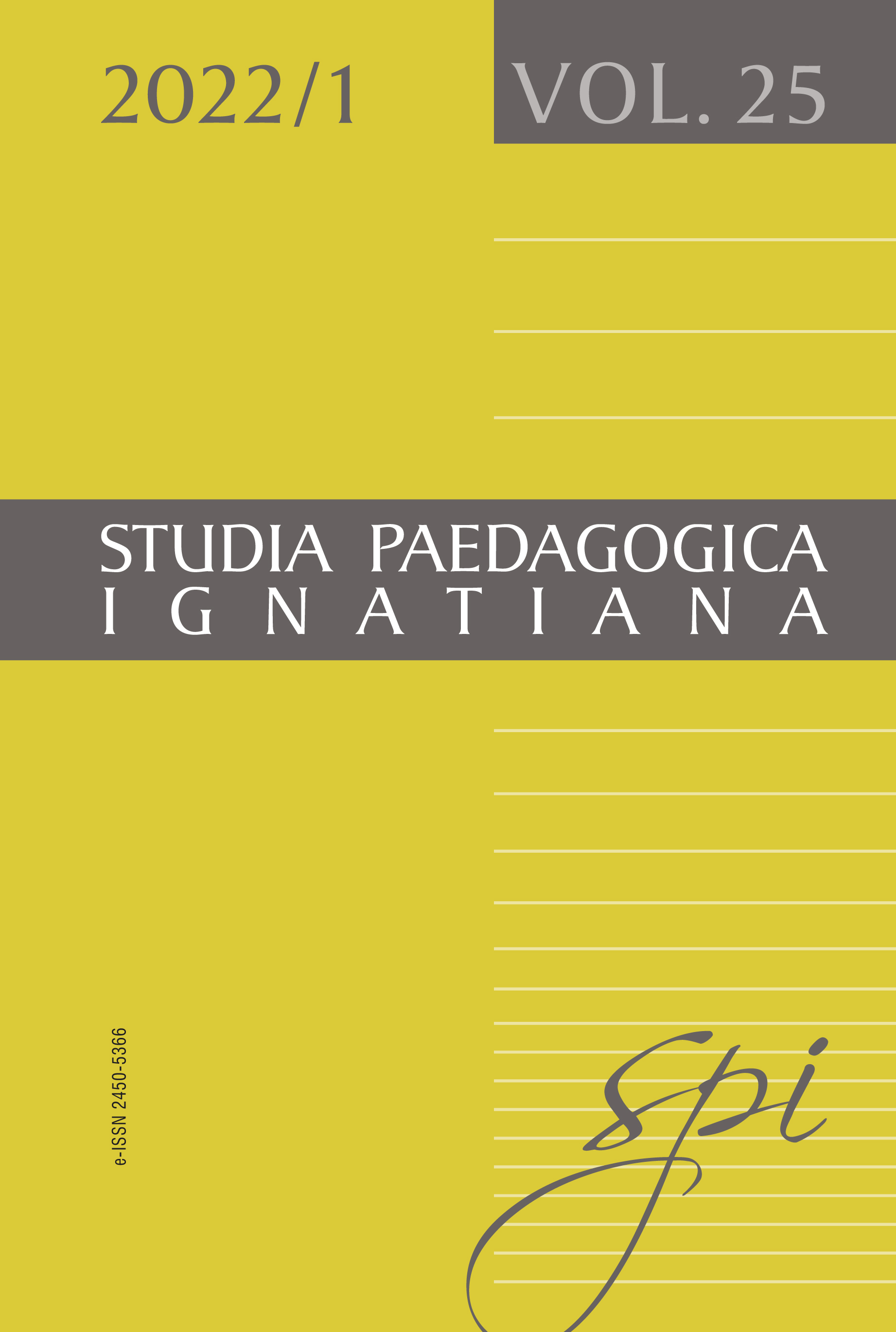Znaczenie dobrostanu nauczyciela w procesie kształtowania wartości poznawczych i społecznych
The Meaning of the Well-being of a Teacher during the Process of Teaching Cognitive and Social Values
DOI:
https://doi.org/10.12775/SPI.2022.1.004Słowa kluczowe
wartości poznawcze, wartości społeczne, dobrostan subiektywny, orientacja na ucznia, samokontrolaAbstrakt
Artykuł ma na celu przedstawienie koncepcji dobrostanu subiektywnego (szczęścia) jako propozycji dla przyszłych nauczycieli przedszkolnych i wczesnoszkolnych do stosowania w procesie wychowania do wartości. Autorka stawia tezę, że konieczne jest zdefiniowanie i zrozumienie przez studentów dobrostanu subiektywnego oraz osiągnięcie świadomości, że nauczyciel w polskiej placówce oświatowej jest zdany na samodzielną profilaktykę w tym zakresie w celu kreowania pozytywnego wzorca osobowego. W artykule zwrócono uwagę na konieczność codziennej, systematycznej oraz długoterminowej troski o dobrostan subiektywny w celu zakorzenienia się nawyku samokontroli. Efektywność działań podejmowanych z uczniami jest powiązana z subiektywnym dobrostanem nauczyciela, który nie przekazuje wyłącznie informacji, ale jest wzorem do naśladowania w zakresie nauki wartości społecznych i poznawczych.
Bibliografia
Becker B.E., Huselid M.A., Ulrich D. (2012). Karta wyników zarządzania zasobami ludzkimi, Warszawa: Oficyna a Wolters Kluwer business.
Borkowski J. (2010). System edukacyjny, [w:] M. Dyrda, A.W. Świderski (red.), Rozwój osobowy a system wartości ucznia, Siedlce: Mazowieckie Samorządowe Centrum Kształcenia Nauczycieli, s. 139–145.
Day Ch. (2008). Od teorii do praktyki. Rozwój zawodowy nauczyciela, Gdańsk: Gdańskie Wydawnictwo Psychologiczne.
Dolan P. (2015). Happiness by Design: Finding Pleasure and Purpose in Everyday Life, London: Penguin Books.
Galderisi S., Heinz A., Kastrup M., Beezhold J., Sartorius N. (2015). Toward a New Definition of Mental Health, „World Psychiatry”, t. 14, nr 2, s. 231–233, DOI: 10.1002/wps.20231.
Gardner B., Lally P., Wardle J. (2012). Making Health Habitual: The Psychology of ‘Habit-Formation’ and General Practice, „British Journal of General Practice”, t. 62, nr 605, s. 664–666. DOI: https://doi.org/10.3399/bjgp12X659466.
Gaś Z. (2001). Doskonalący się nauczyciel. Psychologiczne aspekty rozwoju profesjonalnego nauczycieli, Lublin: Wydawnictwo UMCS.
Kinman G., Wray S., Strange C. (2011). Emotional Labour, Burnout and Job Satisfaction in UK Teachers: The Role of Workplace Social Support, „Educational Psychology”, t. 31, nr 7, s. 843–856, DOI: 10.1080/01443410.2011.608650.
Korczyński S. (2014). Stres w pracy zawodowej nauczyciela, Kraków: Oficyna Wydawnicza „Impuls”.
Norrish J.M., Vella-Brodrick D.A. (2009). Positive Psychology and Adolescents: Where Are We Now? Where to From Here?, „Australian Psychologist”, t. 44, nr 4, s. 270–278, DOI: 10.1080/00050060902914103.
Ogińska-Bulik N., Juczyński Z. (2010). Osobowość – stres a zdrowie, Warszawa: Difin.
Seligman M.E.P., Csikszentmihalyi M. (2000). Positive Psychology: An Introduction, „American Psychologist”, t. 55, nr 1, s. 5–14, DOI: 1037/0003-066X,55.1.5.
Seligman M.E.P. (2002). Authentic Happiness: Using the New Positive Psychology to Realize Your Potential for Lasting Fulfilment, New York: The Free Press.
Seligman M.E.P. (2005). Prawdziwe szczęście: psychologia pozytywna a urzeczywistnienie naszych możliwości trwałego spełnienia, przeł. A. Jankowski, Poznań: Media Rodzina.
Seligman M.E.P. (2011). Pełnia życia. Nowe spojrzenia na kwestię szczęścia i dobrego życia, przeł. P. Szymczak, Poznań: Media Rodzina.
Szempruch J. (2013). Pedeutologia. Studium teoretyczno-pragmatyczne, Kraków: Oficyna Wydawnicza „Impuls”.
Tyrańska M. (red.) (2012). Współczesne tendencje w zarządzaniu zasobami ludzkimi, Warszawa: Difin.
WHO. The Global Health Observatory, Health and Well-Being, https://www.who.int/data/gho/data/major-themes/health-and-well-being [dostęp: 2.03.2022].
Woynarowska B. (2017). Edukacja zdrowotna. Podstawy teoretyczne, metodyka, praktyka, Warszawa: Wydawnictwo Naukowe PWN.
Pobrania
Opublikowane
Jak cytować
Numer
Dział
Licencja
Prawa autorskie (c) 2022 Anna Wójcik

Utwór dostępny jest na licencji Creative Commons Uznanie autorstwa – Bez utworów zależnych 4.0 Międzynarodowe.
Autor zgłaszając swój artykuł oświadcza, że:
jest Autorem artykułu (zwanego dalej Utworem) i:
- przysługują mu wyłączne i nieograniczone prawa autorskie do Utworu,
- jest uprawniony/a do rozporządzania prawami autorskimi do Utworu.
Udziela Uniwersytetowi Ignatianum w Krakowie nieodpłatnej, niewyłącznej, nieograniczonej terytorialnie licencji do korzystania z Utworu na następujących polach eksploatacji:
- utrwalania utworu w formie papierowej, a także na nośniku cyfrowym lub magnetycznym;
- zwielokrotnienia utworu dowolną techniką, bez ograniczenia ilości wydań i liczby egzemplarzy;
- rozpowszechniania utworu i jego zwielokrotnionych egzemplarzy na jakimkolwiek nośniku, w tym wprowadzenia do obrotu, sprzedaży, użyczenia, najmu;
- wprowadzenia utworu do pamięci komputera;
- rozpowszechniania utworu w sieciach informatycznych, w tym w sieci Internet;
- publicznego wykonania, wystawienia, wyświetlenia, odtworzenia oraz nadawania i reemitowania, a także publicznego udostępniania utworu w taki sposób, aby każdy mógł mieć do niego dostęp w miejscu i czasie przez siebie wybranym;
- w zakresie praw zależnych do Utworu, obejmujących w szczególności prawo do dokonania koniecznych zmian w Utworze, wynikających z opracowania redakcyjnego i metodycznego, a także do dokonania tłumaczenia Utworu na języki obce.
Udzielenie licencji następuje z chwilą przekazania Utworu na rzecz Uniwersytetowi Ignatianum w Krakowie. Uniwersytet Ignatianum w Krakowie jest uprawniony do udzielania dalszych sublicencji do Utworu, w zakresie udzielonego prawa. Licencja jest ograniczona czasowo i zostaje udzielona na okres 15 lat, licząc od daty jej udzielenia.
Polityka prywatności
Statystyki
Liczba wyświetleń i pobrań: 1584
Liczba cytowań: 0



